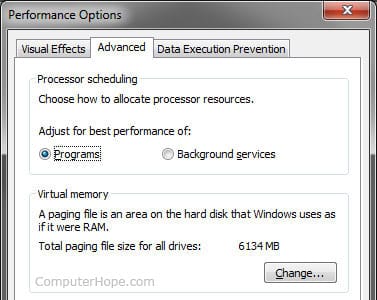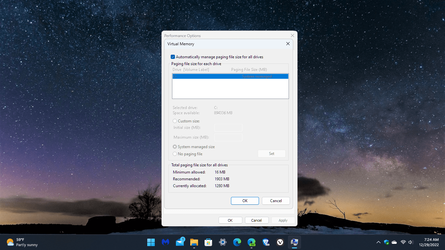- Local time
- 1:57 PM
- Posts
- 7,467
- OS
- Windows 11 Pro + Win11 Canary VM.
Ughh - it talks about pagefiles executing things more slowly than if run in native RAM as a reason to use auto. What a load of twaddle.Best to just let Windows manage the page file.

Should I Change My Microsoft Windows Page File Size?
Reasons why it is not a good idea to change the Windows page file size or disable it.www.computerhope.com
Whole point of a pagefile is it is in use when RAM has run out. That is independent of using auto or setting a pagefile.
Rest of article is just typical rehashing other websites with no substance. It does state that the size of a manual pagefile depends on other factors (as discussed earlier).
I bet this article was written by Dave from down the pub.
My Computer
System One
-
- OS
- Windows 11 Pro + Win11 Canary VM.
- Computer type
- Laptop
- Manufacturer/Model
- ASUS Zenbook 14
- CPU
- I9 13th gen i9-13900H 2.60 GHZ
- Motherboard
- Yep, Laptop has one.
- Memory
- 16 GB soldered
- Graphics Card(s)
- Integrated Intel Iris XE
- Sound Card
- Realtek built in
- Monitor(s) Displays
- laptop OLED screen
- Screen Resolution
- 2880x1800 touchscreen
- Hard Drives
- 1 TB NVME SSD (only weakness is only one slot)
- PSU
- Internal + 65W thunderbolt USB4 charger
- Case
- Yep, got one
- Cooling
- Stella Artois (UK pint cans - 568 ml) - extra cost.
- Keyboard
- Built in UK keybd
- Mouse
- Bluetooth , wireless dongled, wired
- Internet Speed
- 900 mbs (ethernet), wifi 6 typical 350-450 mb/s both up and down
- Browser
- Edge
- Antivirus
- Defender
- Other Info
- TPM 2.0, 2xUSB4 thunderbolt, 1xUsb3 (usb a), 1xUsb-c, hdmi out, 3.5 mm audio out/in combo, ASUS backlit trackpad (inc. switchable number pad)
Macrium Reflect Home V8
Office 365 Family (6 users each 1TB onedrive space)
Hyper-V (a vm runs almost as fast as my older laptop)







